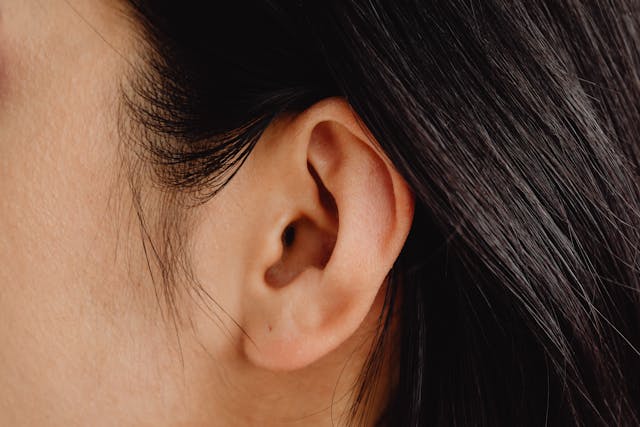Did you know that smoking can cause serious damage to your ears too?
It might not be the first thing you think about, but it makes sense when you realise how close your ears are to your nose, mouth, and eyes—all areas directly hit by the chemicals in cigarette smoke.
As any ENT (eyes, ears, nose, and throat) specialist will tell you, if one of these parts is affected, it often has a knock-on effect on the others.
In this post, we’ll break down how that happens and what you can do to protect your hearing.
Chat to a prescriber
Bulk-billed phone consultations
TGA-authorised clinicians
Nicotine vaping scripts available
Can Smoking Contribute to Hearing Loss?
Yes, smoking cigarettes can actually lead to hearing loss.
Even if you’re not a smoker yourself, your ears aren’t out of harm’s way if you’re frequently around smokers or exposed to secondhand smoke.
When smoke gets into your ears, it causes the tiny hair cells inside, known as stereocilia, to deteriorate faster than usual.
This can bring on tinnitus, a ringing or buzzing sound, which is often an early sign of hearing loss.
Recent research shows there’s enough evidence to confirm that both active and passive smoking can cause tinnitus, no matter your age.
If you regularly experience tinnitus due to smoke exposure, it could lead to hearing loss within a few years.
And let’s face it—nobody wants to lose their ability to enjoy music or have proper conversations with others.
Quitting smoking, or avoiding secondhand smoke, could save you from that unnecessary and preventable hearing damage.
Can Inhaling Secondhand Smoke Cause Hearing Loss?
Are you living with someone who smokes indoors? It might be time to have a chat with them about how their habit could be harming your health.
Don’t be afraid to speak up—your ears, lungs, heart, and other organs could all suffer permanent damage if you’re constantly exposed to secondhand smoke.
Studies show that both smokers and those exposed to secondhand smoke struggle to hear softer sounds and often misinterpret louder ones.
In fact, secondhand smokers frequently experience sounds as muffled or distorted.
So, for your well-being, it’s worth letting them know the risks and encouraging them to smoke outside or quit altogether.
The same study also reveals that secondhand smoke can cause irreparable damage to your inner ear.
You might have heard that secondhand smoke only mildly harms the person exposed, but that’s far from the truth.
Continuous smoking or regular exposure to secondhand smoke can lead to permanent hearing damage over time.

The Primary Causes of Hearing Loss
We naturally lose much of our hearing as we age – a condition called presbycusis. But, this condition only happens to about 3 out of 10 people over the age of 65. This means that other external yet preventable factors can cause massive hearing loss. Here are some of them.
Hereditary Effects
Certain genetic factors can increase your susceptibility to auditory damage. For instance, if anyone in your family has experienced hearing loss by the age of 30 or 40, it’s highly likely you might lose yours at that age group as well.
Ear Infections
Ear infections, particularly in the middle ear, can lead to hearing loss if left untreated. These infections can cause inflammation and fluid buildup that can block your hearing and cause further damage to your ear canal and other areas of the ear. Infections are highly likely if you’re living in an area susceptible to colds or where bacteria or viruses.
Loud Noises
It’s best to turn down what you’re listening to or stop using earphones or earbuds altogether as loud music and noises are the common causes of hearing loss.
The inner ear contains tiny hair cells called stereocilia, which convert sound vibrations into electrical signals that are sent to the brain. When exposed to loud noises, these hair cells can become overstimulated and would bend or break if it consistently happens.
The extent of the damage depends on the loudness of the noise and the duration of exposure. For instance, a one-time exposure to an extremely loud noise, such as an explosion, can cause immediate and permanent damage.
Chronic exposure to loud noises, such as those in a noisy workplace or from listening to loud music over time, can also cause gradual hearing loss.
The Best Solution: Quit Smoking for Good
When you quit smoking, your body undergoes several positive changes that can contribute to reducing the risk of hearing loss and improving overall ear health. Here’s how quitting smoking can benefit your ears.
Improved Blood Circulation
Smoking can damage blood vessels and reduce blood flow, including to the ears. When you quit smoking, blood circulation improves and provides the nourishment the inner ear needs.
Reduced Inflammation
Smoking causes inflammation throughout the body, including in the ear. By quitting smoking, you reduce inflammation in the ear canal and the possible damage to your stereocilia, improving your overall hearing health and reducing the risk of early hearing damage.
Lowered Risk of Infections
Smoking weakens the immune system, making you more susceptible to ear infections. Quitting smoking can help strengthen your immune system and help reduce the risk of ear infections and related complications.
Less Exposure to Harmful Chemicals
Cigarette smoke contains harmful chemicals that can damage the delicate hair cells in the inner ear. In addition, you would also help your other organs – the lungs, heart, and other parts of your body – to recover from the damage.
Improved Overall Health
Quitting smoking has numerous health benefits, including reducing the risk of cardiovascular disease and diabetes, which are both linked to hearing loss. By improving your overall health, you also improve the health of your ears.

Summary
Can smoking cause hearing loss? Absolutely, but it’s not the worst thing it can do to you. It can also have you develop many lethal yet preventable diseases that stopping smoking can reduce or ultimately stop.
It’s understandable that smoking is difficult to quit – most people have to go through quitting multiple times. But, if you have a helping hand in quitting, you can definitely quit for good and keep yourself safe from the harms of smoking.
Smokefree Clinic gives you access to many medically reviewed and trustworthy resources that can inform and aid you in your path to wellness, so have a look around!
If you’re ready to get started, Smokefree can connect you to Australian healthcare professionals who excel in helping patients quit smoking for good, including using responsible vaping products where appropriate.
Link Reference
- https://www.ncbi.nlm.nih.gov/pmc/articles/PMC5855477/
- https://www.ncbi.nlm.nih.gov/pmc/articles/PMC4117391/
- https://www.asha.org/public/hearing/sensorineural-hearing-loss/
- https://www.nidcd.nih.gov/health/age-related-hearing-loss

